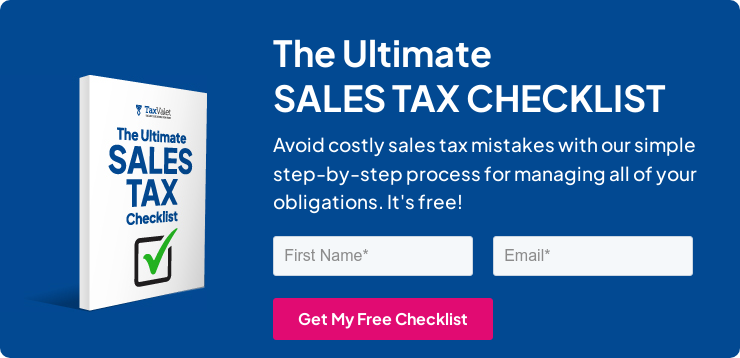Quick Answer: You need to get a sales tax permit in South Dakota if you have a physical presence or meet economic or affiliate nexus requirements. South Dakota also has notice and reporting requirements that may affect businesses that do not meet other nexus criteria in South Dakota.
What is Sales Tax Nexus Anyway?
Your business owes sales tax in any state where it has “sales tax nexus”. In short, if you have sales tax nexus you need to collect and remit sales tax. If you don’t have sales tax nexus, you generally don’t need to get a permit.
Sales tax nexus is a legal term that means you have crossed a threshold and now have a sales tax collection responsibility in the state. Nexus can be created by having a physical presence, economic presence, or by other factors. Nexus rules vary by state and retailers have specific nexus rules based on where they have people, property or inventory.
What Should You Do Once You Determine You Have Sales Tax Nexus?
Once you determine that you have sales tax nexus in South Dakota, your next step is to register for a sales tax permit in the state. Check out our blog post on getting a sales tax permit in South Dakota for more information about that process.
If you are not interested in doing the work of getting the permit yourself, TaxValet can handle the permit registration for you with our Sales Tax Permit Registration Service.
Common Ways to Have Sales Tax Nexus in South Dakota
1. Economic nexus in South Dakota
If you have made $100,000 of annual sales in South Dakota, then you are required to register for, collect, and pay sales tax to the state. If you meet this threshold, it does not matter if you have a physical presence in South Dakota. Nexus has been created based on your volume of sales. South Dakota removed its 200 transaction-count threshold from its economic nexus threshold in July 2023.
For more information see SDLRC – Codified Law 10-64-2.
If you need help determining which states you have crossed economic nexus thresholds, check out our Sales Tax Starter Kit service.
2. Physical presence nexus in South Dakota
The following creates physical presence nexus in South Dakota. If you have any of the following in South Dakota, you need to get a sales tax permit:
- An office, distribution house, sales house, warehouse, or other place of business, or
- Agents operating within the state under the authority of the retailer or its subsidiary
For more information, please see SDLRC- Codified Law 10-46-1.
If you need help determining which states you have a physical presence in, check out our Sales Tax Starter Kit service.

Uncommon Ways to Have Sales Tax Nexus in South Dakota
1. Affiliate Nexus in South Dakota
What exactly is affiliate nexus? Affiliate nexus can exist when a business has sufficient contact with a state through a separate business. If your out-of-state business has a relationship with an in-state business, then you may have affiliate nexus.
Please keep in mind that an “affiliated business” does not necessarily mean that it is a marketing “affiliate” in the typical sense of the word. Instead, “affiliate nexus” refers to the relationship between two businesses.
A retailer is considered to have affiliate nexus in South Dakota if any of the following conditions are met:
- Holds a substantial interest in, or is owned by, a South Dakota retailer.
- Sells the same or a substantially similar line of products under the same or a similar business name.
- An in-state facility/employee is used to advertise, promote, or facilitate sales to a South Dakota consumer.
- Makes sales to South Dakota customers by mail, telephone, internet, or other media that has a contract with an entity to perform installation, maintenance or repair services for the retailer’s purchasers in South Dakota.
For more information about affiliate nexus, see SD SB147.
2. Notice and Reporting Requirements
If you do not meet any of the nexus criteria in South Dakota, you may still have notice and reporting requirements. You must notify your customers of their liability to pay use tax on their purchase.
From the SD Codified Law 10-63-2: “Each non-collecting retailer shall give notice that South Dakota use tax is due on nonexempt purchases of tangible personal property, services…..and shall be paid by the South Dakota purchaser. The notice shall be readily visible and contain the information as follows:
- The non-collecting retailer is not required, and does not collect South Dakota sales or use tax;
- The purchase is subject to state use tax unless it is specifically exempt from taxation;
- The purchase is not exempt merely because the purchase is made over the Internet, by catalog, or by other remote means;
- The state requires each South Dakota purchaser to report any purchase that was not taxed and pay tax on the purchase. The tax may be reported and paid on the South Dakota use tax form; and
- The use tax form and corresponding instructions are available on the South Dakota Department of Revenue website.”
For more information about notice and reporting requirements, see SDLRC – Codified Law 10-63-2.
Do You Need a Sales Tax Permit in South Dakota If You Only Sell on Marketplaces?
If you are an out-of-state online retailer who ONLY sells on approved marketplaces (such as Amazon, eBay, etc), South Dakota sales tax will be remitted by the marketplace, however, South Dakota still requires you to get a sales tax permit. You may request to be put on an active, non-filing status if you meet certain requirements.
For more information about this please see Remote Seller-Exclusive Marketplace Sales.
If you are an e-commerce seller who is unsure of where you need to get a sales tax permit, feel free to check out our Sales Tax Starter Kit service.
Receive Important Sales Tax Updates to Your Inbox!
Join our mailing list to receive free updates that could help protect your business from audit.
Get in Touch
Company
Disclaimer: Nothing on this page should be considered tax or legal advice. Information provided on this page is general in nature and is provided without warranty.
Copyright TaxValet 2023 | Privacy Policy | Site Map

Disclaimer: Our attorney wanted you to know that no financial, tax, legal advice or opinion is given through this post. All information provided is general in nature and may not apply to your specific situation and is intended for informational and educational purposes only. Information is provided “as is” and without warranty.
What you should do now
- Get a Free Sales Tax Plan and see how Tax Valet can help solve your sales tax challenges.
- Read more articles in our blog.
- If you know someone who’d enjoy this article, share it with them via Facebook, Twitter, LinkedIn, or email.


